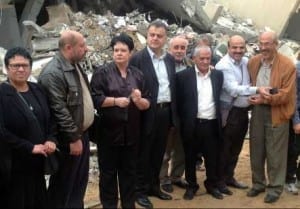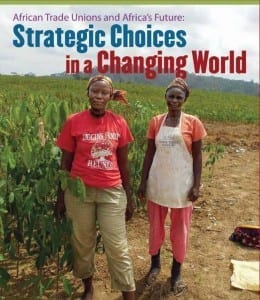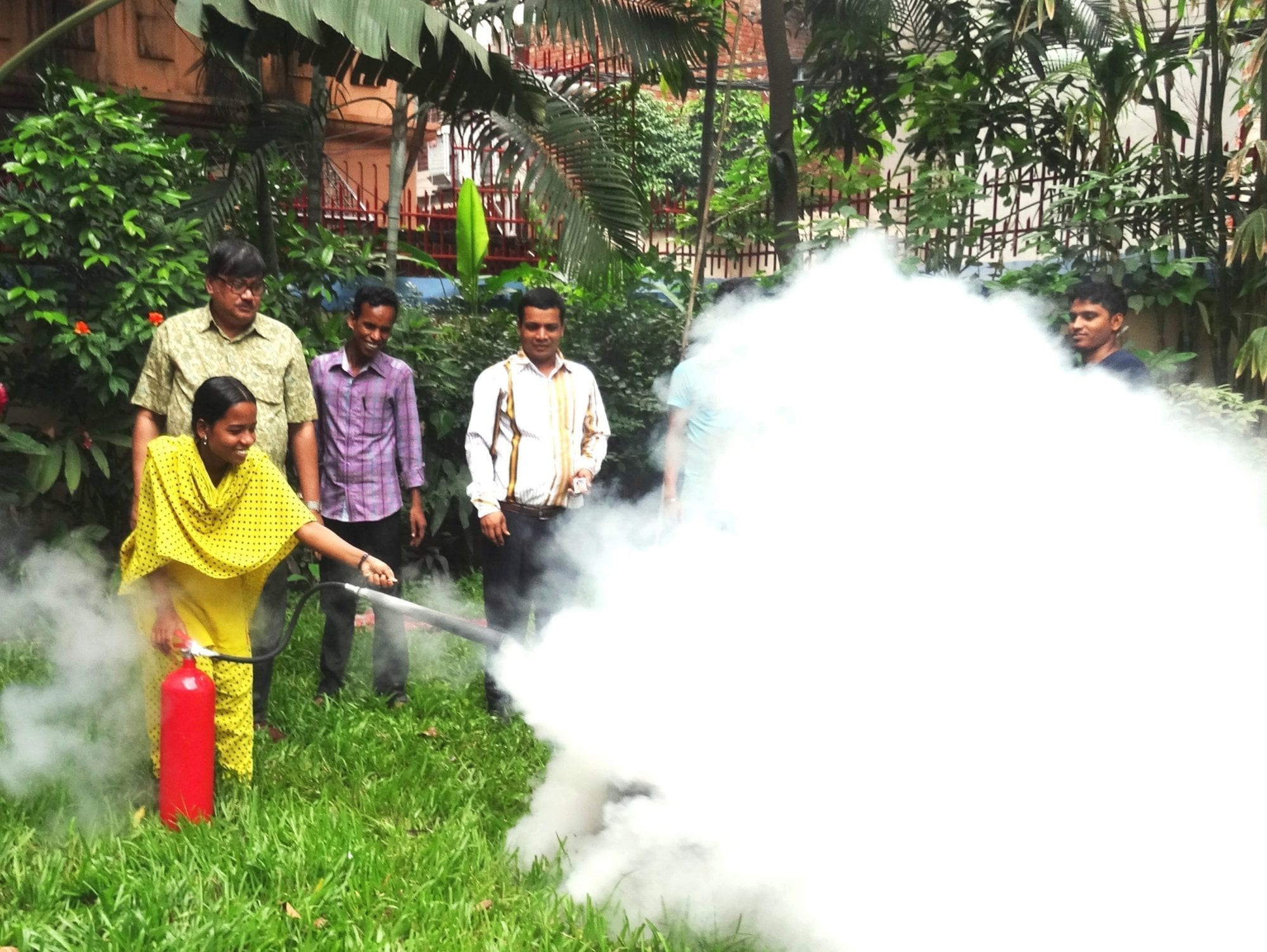Jul 23, 2014

ITF-affiliated bus drivers in Gaza are among workers affected by the current conflict. Credit: ITF
On an ordinary working day, activists from the Palestinian General Federation of Trade Unions (PGFTU)-Gaza conduct labor rights education and outreach to worksites around Gaza. In the past six months, Organizing Department Head Ahmad Hillis and other union officials have visited more than 180 workplaces including hospitals, pharmacies, universities and construction sites. (Arabic version of this article here.)
Through one-one-one conversations, the organizers have documented exchanges with 234 workers and informally registered 54 new union members. (PGFTU-Gaza is not currently able to maintain offices or collect membership fees.)
Today, as the fighting rages, the union’s outreach work is different. Trade unionists spend their days checking on other families and injured persons, talking with employees and owners of razed workplaces, trying to provide assistance where they can and helping to get people to United Nations agencies and aid organizations, where they can receive lifesaving and other assistance.
In coordination with PGFTU sisters and brothers in the West Bank, and with Solidarity Center staff and colleagues from across the international labor movement, the PGFTU has worked tirelessly to develop the federation’s role as a representative civil society organization with a truly national reach.
The brave and peaceful work of these unionists serves a social movement for greater equality and respect for human rights.
The institutions of the international trade union movement have been speaking publicly about the ongoing Palestinian/Israeli conflict. For more information:
Jul 15, 2014
 The rapid economic growth of many African countries is not translating into good jobs or worker rights, especially for women, and worker organizations, governments and business must be more proactive in expanding employment and improving wages and social protections, according to a new Solidarity Center report.
The rapid economic growth of many African countries is not translating into good jobs or worker rights, especially for women, and worker organizations, governments and business must be more proactive in expanding employment and improving wages and social protections, according to a new Solidarity Center report.
“African Trade Unions and Africa’s Future: Strategic Choices in a Changing World” calls for measures to promote job creation, secure worker rights, invest in social and physical infrastructure and achieve gender equality.
Based on a 2013 survey of trade unionists in nine African countries, the report finds that trade unions have played a significant part in the political and economic lives of their countries, for instance by shaping policy around issues such as the minimum wage and social insurance coverage, and in promoting and defending democratic institutions.
But rapid globalization has created new challenges that will most effectively be solved through coordination among unions, government and business. Some of measures the report calls for include:
• Confronting obstacles to equal rights and equal participation for women. Sustainable development and inclusive economic growth are only possible when gender inequity, a key human rights component, is integrated throughout the process. Such actions should include opening up economic sectors and occupations that are still largely closed to women, as well as advancing education for women and social support for family obligations now primarily met by women.
• Taking innovative approaches to addressing the informal economy.National and global economic trends suggest that the proportion of workers in formal employment will continue to decrease. Worker associations and African governments need to share experiences and invest more resources to empower workers in the informal economy and extend social protections to informal-sector workers, especially women.
• Enforcing existing international worker rights standards. A broad body of international and national laws and standards protects workers and their rights, but they generally are not enforced, including by countries participating in programs like the Africa Growth and Opportunity Act (AGOA). As a result, workers are vulnerable to abuses such as unsafe and unhealthy workplaces, forced labor, lost wages, sexual harassment and workplace violence.
Released on the eve of the August 5–6 White House Africa Leaders Summit and the annual AGOA meeting, African Trade Unions and Africa’s Future serves as a clear call to action to the continent’s most powerful leaders and policymakers.
Jul 14, 2014
Tunisia is among many countries around the world seeing rapid growth in their informal economies. In 2013, Tunisia’s informal economy accounted for 38 percent of the country’s gross domestic product (GDP), up from 30 percent in 2010.
A new study by the Tunisian General Labor Union (Union Générale Tunisienne du Travail, UGTT) and the Solidarity Center looks at factors fueling the expansion of Tunisia’s informal economy and offers recommendations for helping workers in the informal sector get job security and social protections they often do not have as domestic workers, street vendors and construction workers.
“The Current State of the Informal Economy in Tunisia as Seen through Its Stakeholders: Facts and Alternatives,” incorporates data from a field survey of 1,128 informal economy workers conducted by 100 UGTT young worker volunteers. The study, which also synthesizes information from available data, provides a rare look at a growing global phenomenon in which work is increasingly outsourced, subcontracted, temporary and part-time—leaving workers with no benefits or social protections.
Among the report’s findings:
• Workers in Tunisia’s informal economy lack basic decent work conditions such as social protection, health insurance, professional security and union rights and freedom.
• Young workers are especially vulnerable. Because they are concentrated primarily in the tourism sector, their wages are low and they have little job stability.
• The rapid growth of the informal economy has resulted in an annual 7 percent fiscal loss to the Tunisian national budget, badly impacting public spending and blocking the expansion of worker economic and social rights.
As UGTT Secretary General Houcine Abbassi says in a foreword to the report: “Because the informal economy neither contributes to the nation’s fiscal base nor offers workers social security protection, it is a serious challenge that must be addressed so as to ensure a national economic recovery and decent working conditions and social justice for all workers.”
Tunisia’s National Economic Dialogue Commission on the Informal Economy has adopted the study as an official reference document and has referred to it in its recommendations.
Read the full report.
Jul 13, 2014

Child labor survivor Evelyn Chumbow is working to end the trafficking of children. Credit: Solidarity Center
At age 9, Evelyn Chumbow was trafficked overseas from Cameroon to become a domestic worker for a family in Maryland. She worked from 6 a.m. to midnight, seven days a week, was forced to sleep on the floor without a room of her own and regularly beaten. Each day, she took her employer’s children to school, but was not allowed to attend. At 17 she escaped, but had no identification and didn’t know her birthday or age.
“There was no where to run and get help,” says Chumbow. Now a student at the University of Maryland, Chumbow spoke at a briefing yesterday on Capitol Hill in Washington, D.C., where panelists discussed efforts to address child labor, especially among domestic workers.
Some 168 million children toil in fields, in brick kilns and at industrial settings around the world, receiving little or no formal education and likely to remain in the cycle of poverty that led to their arduous labor. Although child labor has decreased globally in recent years, child labor in domestic work has increased by 9 percent in the past four years, Jo Becker, advocacy director at Human Rights Watch, said at the briefing. The International Labor Organization (ILO) says nearly half of child domestic workers are under age 14, and nearly all are girls.
The briefing, “Promoting the Rights of 15 Million Domestic Workers,” hosted by a bipartisan group of U.S. Senate and House members, marked World Day Against Child Labor. Observed each year on June 12, the day is a time to remind the world about the plight of child laborers and spur action to end the scourge. The Child Labor Coalition and the Alliance to End Slavery & Trafficking (ATEST) sponsored the event.
Tiffany Williams from the National Domestic Workers Alliance (NDWA), pointed out that child labor in domestic work involves a similar “pattern of abuse” around the globe: Employers hold the workers’ passports, making it difficult for them to leave; workers are paid low wages or sometimes not paid at all and are forced to toil for long hours, working weeks or months without a break. David Diggs, executive director of Beyond Borders, also took part in the panel.
Many child laborers who work in domestic service also are trafficked, as Chumbow was, a point made by Tim Ryan, Solidarity Center Asia Regional Program director, who moderated the panel. Many labor recruiters charge exorbitant fees for their services, forcing workers into debt bondage, falsify documents and deceive workers about their terms and conditions of work increasing vulnerability to human trafficking.
Around the world, millions of workers are unable to find jobs or are paid wages too low to support their families—and many children work to help their families survive.
They turn to work in the informal economy, where pay is erratic, workplace safety and other labor laws do not apply, and the social protections granted to formal economy workers are non-existent.
“As a society, we have to ask why this is happening,” said Williams. “Domestic work is one of the few ways less educated women can care for their families.”
Eliminating child labor will succeed in large part when adults have decent work—a connection recognized by participants at last year’s Third Global Conference on Child Labor. The Brasilia Declaration, issued at the International Labor Organization-sponsored conference, calls for “measures to promote decent work and full and productive employment for adults” so that “families are enabled to eliminate their dependence on the income generated by child labor.

Jul 11, 2014
Twenty-four garment worker union leaders and organizers in Bangladesh have completed a first-of-its-kind, in-depth training course on fire and building safety, conducted by the Solidarity Center and Selim Newaz Bhuiya, former deputy director of Bangladesh Fire Service and Civil Defense.
The 10-session course aims to equip union leaders with essential knowledge and skills on workplace safety. These workers will now, in turn, educate their co-workers and strengthen their unions’ ability to raise and rectify unsafe factory working conditions.
The training was supported under a grant from the U.S. Department of Labor.
Sanjida, a worker and newly elected woman union leader from Masco Industries Ltd. in Gazipur, said, “I am now a graduate of the fire and building safety course, which makes me very happy. By participating in this training program, I now know how to protect workers from fire and how to identify risks. I learned new skills that will help me to teach other workers and be a stronger union leader.”
In a ceremony concluding the training, 18 factory-level union leaders and six organizers received certificates in recognition of their hard work and new knowledge on workplace safety. These leaders are the first of 14 groups who will eventually complete the course and will go on to help their unions build effective occupational safety and health committees to raise workers’ safety concerns with their employers.
Speaking at the event, attended by U.S. Ambassador Dan Mozena and Bangladesh Labor Secretary Mikail Shiper, Solidarity Center Bangladesh Country Program Director Alonzo Suson said, “Workers around the world have found that, by forming unions and speaking with a collective voice, they are better able to ensure safer working conditions. These new union leaders will be able to take what they’ve learned back to their co-workers to make their factories better, healthier and safer places to work.”




